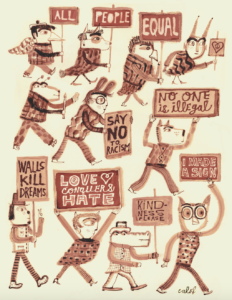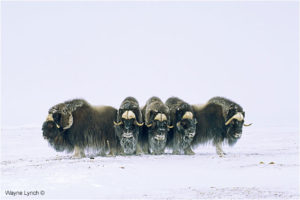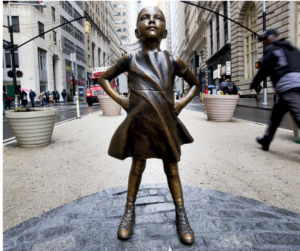 I love Fierce Girl.
I love Fierce Girl.
As soon as I saw her, hands on hips, and her chin jutting out toward that bull, I loved her. Yes, I know she is white girl and that’s not intersectional enough for me. Yes, I know she was put there by Big Money and that means they have their own corporate interests at the center.
I love her anyway.
And yes, I know she is called Fearless Girl but I am renaming her. I am never going to tell my daughter that she should fear less. I am going to tell her to be fierce. I am going to tell myself to be fierce.
These days I often feel small and fragile and powerless, almost like a little girl. Who wouldn’t? We are facing a cabal of rich, powerful, racist, sexist white men, who have their fingers in every pot and their hands grasping at every pussy. They plan to make us sick and poor and weak so they can take everything for themselves.
But Fierce Girl puts her hands on her hips. Fierce Girl juts out her chin. Fierce Girl has no more fucks to give.
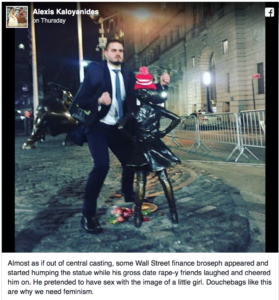 When I saw this photo of a white guy in a suit pretending to rape Fierce Girl, I went rage-y. The woman who took the picture nailed it when she wrote: “Douchebags like this are why we need feminism.”
When I saw this photo of a white guy in a suit pretending to rape Fierce Girl, I went rage-y. The woman who took the picture nailed it when she wrote: “Douchebags like this are why we need feminism.”
This week I’ve been working on a series of blog posts for the #SJYALit project (Social Justice YA Literature) at Teen Librarian Tool box. In April, authors Elana K. Arnold, Mindy McGinnis, Isabel Quintero, and I will be featured in a series about feminism. I’ve been thinking a lot about why and how I wrote POINTE, CLAW, and why I think it is the book I needed to release at exactly this time in history.
Way before I started writing POINTE, CLAW, I was jotting down nuggets that might find their way into its pages. Things like: men staring at young ballet dancers, vaginal plastic surgery, men’s responses to menstruation, girls kissing each other, friendships that turn into more than friendship, removing dry tampons, men following girls into the lingerie department, the ways that women can help or hurt each other, the ways in which fathers avoid daughters… The douchebag pretend to rape Fierce girl would have gone on my list.
In a recent article about the upsurge in interest in her 1985 book THE HANDMAID’S TALE, Margaret Atwood discusses a question that she is often asked about the book: Is it a “feminist” novel?
Here’s her answer:
If you mean an ideological tract in which all women are angels and/or so victimized they are incapable of moral choice, no. If you mean a novel in which women are human beings — with all the variety of character and behavior that implies — and are also interesting and important, and what happens to them is crucial to the theme, structure and plot of the book, then yes. In that sense, many books are “feminist.” Why interesting and important? Because women are interesting and important in real life. They are not an afterthought of nature, they are not secondary players in human destiny, and every society has always known that.
I keep thinking about that first line. Ideological tract. Angels. Victimized to the point of no moral choice. It’s a little weird. Why would I assume that “feminist novel” means any of those things?
Any kind of ideological tract would be a shitty novel from a craft perspective. A novel that presents all women as perfect is, in fact, a reflection of a sexist system that either demonizes women or puts them on a pedestal. A novel with such an oppressive system against women that they can do nothing turns women into mere plot points.
Instead, Atwood goes on to say that novels should present women as human beings. Let that sink in. Sounds a lot like Hillary Clinton saying that women’s rights are human rights. Atwood takes the next step to say that any book which depicts fully-fleshed, complicated, complex female characters with agency could be considered feminist. She goes on to imply (though I wish she had stated it explicitly) that the other necessity of a feminist novel is to explore how these characters push against a system designed for the benefit of men.
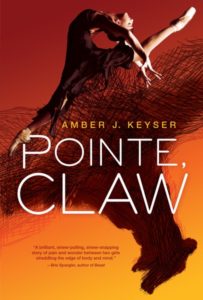 I have no doubt that POINTE, CLAW is a feminist novel. The vast majority of the characters, both animal and human, are female. They are mothers and daughters and wives. They are dancers and strippers and home-based business owners and doctors and teachers and students. They are angry and content and complicit and miserable. My goal was to show all the different ways girls and women get boxed in by the expectations of a patriarchal society that has very narrow ideas about what defines a woman.
I have no doubt that POINTE, CLAW is a feminist novel. The vast majority of the characters, both animal and human, are female. They are mothers and daughters and wives. They are dancers and strippers and home-based business owners and doctors and teachers and students. They are angry and content and complicit and miserable. My goal was to show all the different ways girls and women get boxed in by the expectations of a patriarchal society that has very narrow ideas about what defines a woman.
It’s a rage-y book. It’s a Fierce Girl book. I’d like to take a copy and bludgeon the Douchebag with it. Because I have no more fucks to give.
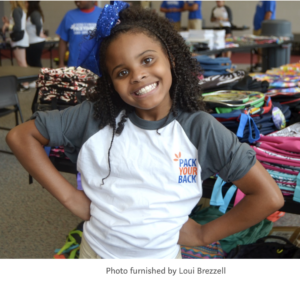 In the course of my activism work over the last two years, I have closely followed the young people who are on the front lines of the Resistance. I follow Mari Copeny, the girl fighting to get clean water for Flint, Michigan; the Parkland teens demanding an end to gun violence; Greta Thunberg, the activist demanding action on the looming global climate catastrophe; and many others.
In the course of my activism work over the last two years, I have closely followed the young people who are on the front lines of the Resistance. I follow Mari Copeny, the girl fighting to get clean water for Flint, Michigan; the Parkland teens demanding an end to gun violence; Greta Thunberg, the activist demanding action on the looming global climate catastrophe; and many others. 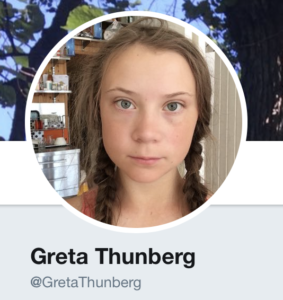 Their presence in social and climate justice movements underscores two realities. The problems they want solved were created by us—the old people of previous generations—and the dire consequences of these problems will be carried by them. And yet, at every turn, pundits and politicians and parents find ways to dismiss and denigrate young people.
Their presence in social and climate justice movements underscores two realities. The problems they want solved were created by us—the old people of previous generations—and the dire consequences of these problems will be carried by them. And yet, at every turn, pundits and politicians and parents find ways to dismiss and denigrate young people. 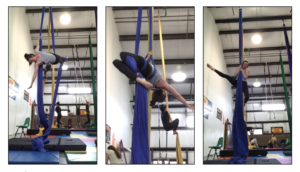 This weekend I’m performing in my first aerial silks recital. I keep going back and forth trying to decide if signing up was a good idea or a terrible idea. I’m one of the very oldest people who trains at the studio, and there are definitely days when I think that maybe I’m too old for circus arts. On Sunday, when I do my routine, most of the audience will be the parents of the other performers. In other words, the audience will be made of my peers.
This weekend I’m performing in my first aerial silks recital. I keep going back and forth trying to decide if signing up was a good idea or a terrible idea. I’m one of the very oldest people who trains at the studio, and there are definitely days when I think that maybe I’m too old for circus arts. On Sunday, when I do my routine, most of the audience will be the parents of the other performers. In other words, the audience will be made of my peers. I’ve been thinking about wishes (which isn’t quite the same as actually wishing). Specifically, I’ve been thinking about what we call wish fulfillment stories. These are stories in which the author writes a successful conclusion to her own inner fantasies. The most obvious wish fulfillment stories are romance novels, a denigrated genre if ever there was one. Pronouncements are made with supercilious distain: that’s not literature or it’s just a love story or that’s impossible.
I’ve been thinking about wishes (which isn’t quite the same as actually wishing). Specifically, I’ve been thinking about what we call wish fulfillment stories. These are stories in which the author writes a successful conclusion to her own inner fantasies. The most obvious wish fulfillment stories are romance novels, a denigrated genre if ever there was one. Pronouncements are made with supercilious distain: that’s not literature or it’s just a love story or that’s impossible.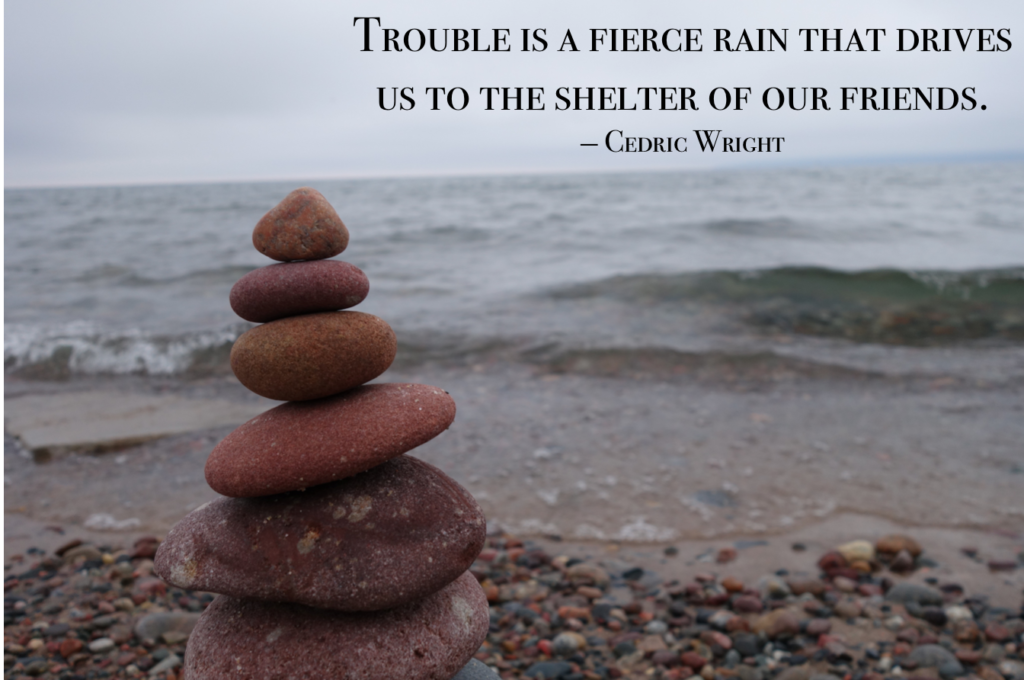
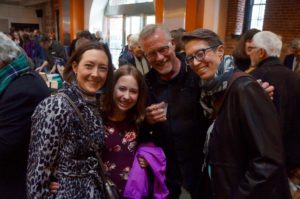
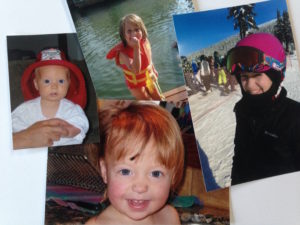 On Saturday, my sweet daughter will be called to the Torah as a bat mitzvah. She will lead our community in ancient prayers and chant ancient words, and more importantly she will find her own meaning in them.
On Saturday, my sweet daughter will be called to the Torah as a bat mitzvah. She will lead our community in ancient prayers and chant ancient words, and more importantly she will find her own meaning in them. I love Fierce Girl.
I love Fierce Girl. When I saw this photo of a white guy in a suit pretending to rape Fierce Girl, I went rage-y. The woman who took the picture nailed it when she wrote: “Douchebags like this are why we need feminism.”
When I saw this photo of a white guy in a suit pretending to rape Fierce Girl, I went rage-y. The woman who took the picture nailed it when she wrote: “Douchebags like this are why we need feminism.” I have no doubt that POINTE, CLAW is a feminist novel. The vast majority of the characters, both animal and human, are female. They are mothers and daughters and wives. They are dancers and strippers and home-based business owners and doctors and teachers and students. They are angry and content and complicit and miserable. My goal was to show all the different ways girls and women get boxed in by the expectations of a patriarchal society that has very narrow ideas about what defines a woman.
I have no doubt that POINTE, CLAW is a feminist novel. The vast majority of the characters, both animal and human, are female. They are mothers and daughters and wives. They are dancers and strippers and home-based business owners and doctors and teachers and students. They are angry and content and complicit and miserable. My goal was to show all the different ways girls and women get boxed in by the expectations of a patriarchal society that has very narrow ideas about what defines a woman.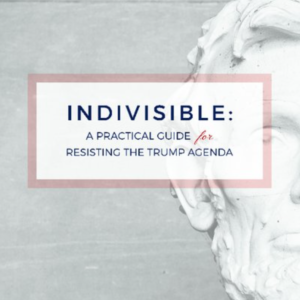 I remember with great clarity the moment when I really “got” evolution. Before that I could have given you a vague explanation for evolution, but that was book learning. The moment I’m talking about was a revelation, an awakening, an eye-opening realization: THIS IS HOW THE WORLD WORKS! Suddenly I grasped that given a few fundamental principles, the inevitable conclusion was that the diversity of life on this planet is explained by descent with modification. It was a fireworks moment.
I remember with great clarity the moment when I really “got” evolution. Before that I could have given you a vague explanation for evolution, but that was book learning. The moment I’m talking about was a revelation, an awakening, an eye-opening realization: THIS IS HOW THE WORLD WORKS! Suddenly I grasped that given a few fundamental principles, the inevitable conclusion was that the diversity of life on this planet is explained by descent with modification. It was a fireworks moment.